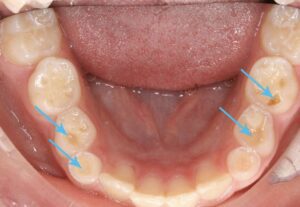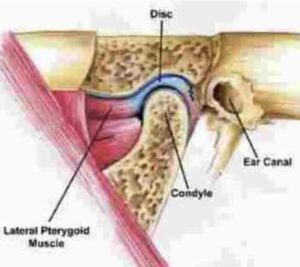


Can bruxism be caused by stress? In short, yes it can. Dr. Cohan in Summerlin, Nevada goes over how stress affects your smile.
Everybody has more "work" than is customary for them these days. Even those of us who consider ourselves to have relatively low-stress lives may go through periods of anxiety or melancholy due to our job surroundings, the schools our children attend, or other social effects of COVID-19. Even though we may believe that our relatively low-stress lifestyles have been a blessing, this may not always be the case.
It's likely that your body is trying to adapt to the changes that are occurring even though you don't "feel" anxious. Additionally, one of the most common unfavorable side effects of your body "feeling" anxious is clenching and grinding your teeth together. The tendency of grinding one's teeth, which can happen consciously or unintentionally, is known as "bruxism," a condition. Your body is merely reacting to the stress in the environment around you whether your TMJ tightens up when you are trying to concentrate, while you are driving in traffic, or when you are dealing with a tough customer.
I do have some terrible news for you, though. Grinding your teeth, which may also be a sign of a sleeping disorder, can have a bad impact on your smile, your TMJ, and possibly your health.
You can still be feeling additional effects in your daily life even if you aren't aware that stress is making you grind your teeth (bruxism).
TMD and teeth grinding have been connected to one another (TMJ).
Your TMJ may experience chronic strain if you grind your teeth, particularly if the problem goes untreated. The joints on either side of your mandible allow it to move up and down as well as to the side and in other directions. A full-blown case of TMJ dysfunction or other negative effects may arise if the cartilage in your TMJ or the muscles in and around it become strained or irritated.
When individuals experience a flare-up, it's not unusual for patients to experience joint pain, headaches, stiffness, and a decreased range of motion. It's probable that you'll notice it when it's least convenient for you, such right after you get up in the morning or right after you arrive home from work. Keep an eye on your body to see if you have any further TMJ symptoms, such as popping or clicking. If so, you might need to wear a bite guard or a splint that covers your teeth to "train" your TMJ to relax when your body is under stress.
The Impact of Bruxism on Dental Work and Enamel
One of the most significant effects of teeth grinding on your smile is the harm it causes to your enamel and dental work. Grinding your teeth can have a lot of adverse effects on your appearance. Even though enamel is tough and resilient—indeed, it's the material in your body that is most resilient—it is not unbreakable. Because of the pressure put on your teeth when you clench and grind them, your tooth enamel will begin to progressively chip away or wear off, leaving behind flat, pointed, or jagged surfaces. The teeth of people who grind their teeth frequently tend to look shorter and flatter throughout the width of their mouths.

But this is only one of the several affects that bruxism has on the way your smile looks. Regularly grinding your teeth could reduce the durability of your current restorations (such as dental fillings, crowns, bridges, dentures, etc.) Although these restorations are very sturdy, the patient's natural tooth structure is still stronger than them. Therefore, if you continue to put extra strain on them day after day while you are under a lot of stress, there is a greater likelihood that something will break.
It's possible that the filling in your tooth breaks in half, that a piece of the tooth around the filling breaks off, or that a layer of porcelain chips off the crown. When anything like that happens, the complete repair must be performed because a patch cannot conceal the damage. The restoration usually becomes more invasive to the tooth because it's possible that some of the tooth's structure was also removed. This worsens a situation that is already difficult.
There is a link between teeth grinding and sleep apnea
Maybe you've been doing it for so long under the impression that the constant stress in your life is to blame. Bruxism, or nighttime teeth grinding, is closely linked to sleep problems such obstructive sleep apnea. Even if your life is very stressful, this is still true (OSA). People who have obstructive sleep apnea (OSA) may wake up feeling exhausted, with a sore jaw, or with headaches because of the ongoing stress on their muscles.
Squeezing your jaws and teeth as tightly as you can is your body's natural response to not obtaining enough oxygen, which may seem paradoxical but is what actually occurs. Because OSA prevents you from actually waking up, it's likely that this cycle of airway obstruction and teeth grinding will go on all night if you have it.
In addition to these symptoms, sleep apnea is linked to depression, tiredness, weight gain, high blood pressure, and a wide range of other symptoms. If you snore or feel tired all the time, it is in your best interest to speak with a sleep physician about getting tested for obstructive sleep apnea or any other sleeping disorder. These days, you can "take home" sleep tests to complete in the comfort of your own bedroom. These studies are appearing more frequently.
Summerlin Dental Solutions will assess you for teeth clenching and grinding, sleep apnea, and TMJ issues as part of the comprehensive exams we provide. To lessen the chance of tooth wear, snoring, or any other detrimental effects linked to your bruxism habit, Dr. Marianne Cohan may advise you to use an oral device or a biting splint.
If you discover that your teeth are becoming increasingly worn down or if your jaw hurts when you wake up, call our Summerlin dentist right away.
CLICK HERE TO SCHEDULE YOUR APPOINTMENT!
GET TO KNOW YOUR BEST DENTIST IN SUMMERLIN
Dr. Marianne Cohan was voted The Best Dentist/ Dental Office and Best Cosmetic Dentist from The Las Vegas Review-Journal in 2020 and 2021. She received her Doctor of Dental Surgery (DDS) from the State University of New York at Buffalo in 1992.

With an emphasis on cosmetic dentistry, complete makeovers, and implant dentistry, Dr. Cohan is committed to continuing education and feels that we never stop learning. Dr. Cohan takes pride in using high-powered magnification to perform minimally invasive restorative dentistry. She uses all the latest technological advances including digital radiography, digital photography, computer simulations, and high-resolution pictures of your proposed treatment on 55-inch screens. She also utilizes CBCT (cone beam) and laser technology.
Dr. Cohan is always available to her patients and is available for any dental emergency.
WHAT MAKES ME GRIND MY TEETH?

THESE ARE QUESTIONS THAT WE ARE ASKED:
HOW TO STOP GRINDING TEETH?
HOW TO STOP GRINDING TEETH IN SLEEP NATURALLY?
HOW TO STOP TEETH GRINDING?
WHY DO I GRIND MY TEETH AT NIGHT?
WHY DO PEOPLE GRIND THEIR TEETH?
WHY ARE MY TEETH CRACKING?
The discomfort that teeth grinding, and jaw clenching may cause can be distressing and have a substantial impact on your everyday life if left untreated. Dentists at Summerlin Dental Solutions have noted an increase in the number of patients clenching and grinding their teeth since the COVID-19 pandemic began. In addition to discomfort in the mouth and gums, jaw joints and muscles can be affected by teeth clenching and/or grinding (sometimes referred to as bruxing). The discomfort it produces can be excruciating, and it can have a considerable impact on your everyday activities.
Are you clenching your jaw at this very moment?
Our top and bottom teeth are only intended to come together when we require them to, such as when biting and chewing food. Our teeth may touch each other just for a short period of time throughout the course of the day, which is normal for us.

As you read this, consider how your teeth and jaws have been positioned unconsciously throughout your life. You should be calm when reading, and your teeth should be apart if you are not eating or chewing while doing so. This is true regardless of whether your lips and mouth are closed.
A dental examination at your Summerlin Dental office can assist in identifying the indicators of teeth grinding and jaw clenching.
It is possible that we will wear down our teeth over time if we grind or clench more than nature intended, and that our jaw muscles will grow tired and stiff as a result.

The jaw joints (also known as the temporomandibular joints or TMJ) that connect the lower jaw to the skull are equipped with a disc that aids in the regulation of the way the jaw joints move and rotate.
Discs can become deformed or displaced, which can result in clicking, decreased function, and discomfort.
One of the most important contributing variables is STRESS.
When we see patients who complain of pain in their jaw joints and surrounding muscles, or who show evidence of grinding or wear on their teeth, we will ask the patient whether they are under any stress at the time.
Many people respond with, "No, I'm not stressed at all!" But when we sit and speak about what's going on in their lives, the sources of stress soon become clear.
Starting a new job, dealing with issues at home or with family, or adjusting to a life transition are all frequent events that might cause us to become more stressed than we are aware of. When we're going through a difficult period, it's not always simple to recognize it.
What can we do to make a difference?
The first step is being aware that you are grinding and clenching your teeth and transforming what is frequently a subconscious behavior into something we can control and stop doing.
We at Summerlin Dental Solutions are trained to examine the health and condition of the jaw joints as well as the muscles that assist you in chewing food.
CLICK HERE TO SCHEDULE AN APPOINTMENT
In some cases, a dental examination may be necessary to detect evidence of teeth grinding and jaw clenching, which can manifest as broken teeth and fillings, worn crowns, or cusps (the term used to describe the raised edge of a tooth), and sensitive jaw muscles. Additionally, sore muscles along the sides of the head and neck are rather prevalent.

When we're going through a difficult or stressful moment, it's not always simple to recognize the signs.
It is possible that stress management and physical therapy will be significant components of a multi-disciplinary approach to patient treatment. If you grind your teeth at night (ask your spouse), you may wake up with aching teeth, jaw joints, or muscles in your head and neck. Consult with your Summerlin Dental office to determine whether a mouth guard for grinding teeth (also known as a bite elevating device or "nightguard") is a good option for your particular situation. These help to keep your teeth and jaws safe from grinding teeth in sleep.
Chewing gum for lengthy periods of time should be avoided by people who suffer from painful jaws as a result of clenching and grinding their teeth. While chewing sugar-free gum has been related to a lower risk of dental decay, it has been shown to exacerbate jaw discomfort in people who grind their teeth.
Identifying the root cause and treating the symptoms
At the end of the day, patients must also address the stresses that may be the underlying cause of their illness or condition. For many people, teeth grinding is a cyclical behavior that lessens or vanishes when the cause of their stress is dealt with or eliminated completely. Others, on the other hand, might find it more difficult.
When you need dental care, the guidance and attention of your Summerlin Dental office can assist you in getting the treatment you require.

GET TO KNOW YOUR DENTIST
Dr. Marianne Cohan was voted The Best Dentist/ Dental Office and Best Cosmetic Dentist from The Las Vegas Review-Journal in 2020 and 2021. She received her Doctor of Dental Surgery (DDS) from the State University of New York at Buffalo in 1992.
With an emphasis on cosmetic dentistry, complete makeovers, and implant dentistry, Dr. Cohan is committed to continuing education and feels that we never stop learning. Dr. Cohan takes pride in using high-powered magnification to perform minimally invasive restorative dentistry. She uses all the latest technological advances including digital radiography, digital photography, computer simulations, and high-resolution pictures of your proposed treatment on 55-inch screens. She also utilizes CBCT (cone beam) and laser technology.
Dr. Cohan is always available to her patients and is available for any dental emergency.